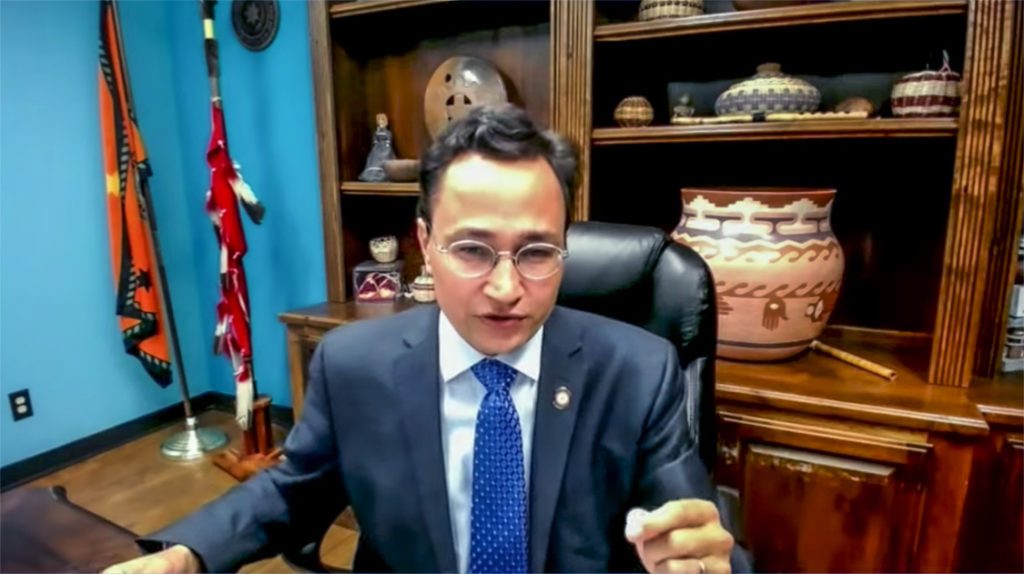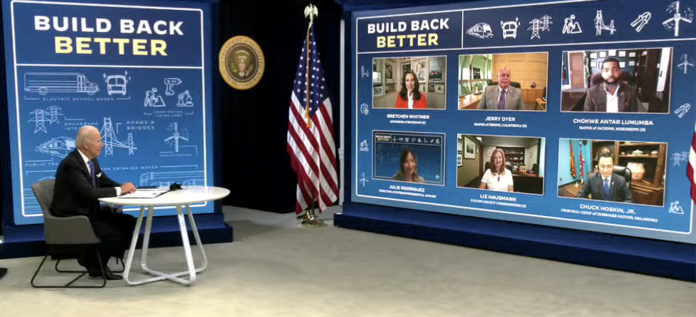TAHLEQUAH, OK – Cherokee Nation Principal Chief Chuck Hoskin Jr. spoke on Wednesday during a White House virtual meeting with U.S. President Joe Biden for a discussion on the importance of the bipartisan Infrastructure Investment and Jobs Act. Participants in the meeting included Michigan Governor Gretchen Whitmer; Fresno Mayor Jerry Dyer; Jackson, MS Mayor Chokwe Antar Lumumba; and Fulton County, GA Commissioner Liz Hausmann.
“It was an honor to participate in Wednesday’s White House virtual meeting with President Biden,” said Chief Hoskin. “Across Indian Country, we value President Biden’s priority to invest in infrastructure improvements. The bipartisan bill will address longstanding needs we have within our Cherokee communities, including broadband connectivity growth, improved roads and bridges, additional clean and sustainable energy projects and increased access to safe drinking water and treatment systems. We know what the best investments needed to address these critical issues for Cherokee families on our reservation include, and this bill helps us achieve this. Cherokee Nation, like all tribal sovereign governments, will benefit long-term from this historic legislation and we appreciate the heightened role that the Biden Administration has provided tribes, as we have been rightfully part of the federal allocation process. This funding, more than $11 billion set aside for Indian Country, will enable Cherokee Nation to keep investing in infrastructure priority areas and it will make our tribal nation stronger and our reservation safer for generations to come. It will also create quality jobs on tribal lands, as we ramp up an overdue national modernization endeavor. I appreciate the Senate passing the bill this week and hope the U.S. House of Representatives also swiftly approves the infrastructure package that has wide ranging support on both sides of the aisle.”
Chief Hoskin’s full remarks:
Osiyo. It’s an honor to be here today to talk about rural broadband.
Cherokee Nation’s goal is to ensure that our citizens living in our most rural communities are the first to get the latest and greatest technology. Our reservation includes low-income, rural areas where our language and culture are thriving, but are underserved by providers.
We estimate that we’ve invested about $5 million in rural broadband and connectivity but for the Cherokee Nation the rate of return is much greater than one of dollars. It means that we can harness the entrepreneurship and innovation that drives our Nation and the Cherokee people. It means that our citizens can connect to the Internet and visit with a fellow Cherokee speaker that resides in a community 50-100 miles away. It means that our elders can remain in their community to access health care, our students can effectively access their education and our citizens can access critical services.

The Cherokee Nation has formed partnerships with existing providers to help meet the needs of our citizens. The digital divide that plagues Indian Country has only been amplified by this pandemic. Early in the pandemic, Cherokee Nation deployed nearly 11,000 mobile hotspots to Cherokee households lacking Internet access. We also quickly deployed more than 35 drive-up Wi-Fi locations, for those lacking the access to connect while socially distanced.
Thanks to a grant from the Department of the Interior, Cherokee Nation recently completed a broadband feasibility study – evaluating connectivity at our 35 Cherokee Nation community centers that are the focal point of our most rural Cherokee communities. Today, more than half of these communities are unserved or underserved.
Cherokee Nation, like most tribal nations, is pursuing the funding from the Tribal Broadband Connectivity Grant Program through the Department of Commerce’s National Telecommunications and Information Administration (NTIA).
We are grateful for your continued commitment to deploy broadband infrastructure on tribal lands. By adding $2 billion to this program in your infrastructure bill, this record amount of funding will make a real impact for Cherokee citizens and those throughout Indian Country.
By extending the grant program to 4 years, the bill will also allow tribes that are located in the most rural, remote communities in the country to achieve its goals so we appreciate the extension. We ask that the Department of Commerce allow flexibility in the use of these grant dollars.
Tribes are in the best position to know the needs of our communities. Providing us with flexibility to determine whether to use fixed vs. wireless, develop timelines to build the infrastructure, and determine which communities are truly unserved and underserved, will help us strengthen the quality of lives of our citizens.
The ability for Cherokee Nation citizens to participate in a digital economy, telehealth, remote learning, telework– these are things that most American’s take for granted but for most on tribal lands – it is seen as something that is unattainable.
Cherokee Nation recently partnered with Starlink on a pilot project to provide Cherokee speakers access to reliable broadband. We connected the home of Jackie and Brenda Bush. During the pandemic, the Bushes missed out on telehealth visits because the service they did have was unreliable. Due to a lack of connectivity, the Bushes put off their routine doctor visits during the pandemic. Once connected, they were able to participate in their first Zoom with me and our Deputy Principal Chief Bryan Warner. They talked about the importance of connectivity, and said that a virtual meeting is something they’ve only seen on TV. Connectivity is vital to perpetuating our language across the reservation. It’s also vital to protect the physical and mental wellness of our communities.
The two most important things we can address is ‘affordability and availability’ and the bipartisan infrastructure bill passed by the Senate yesterday makes great strides at addressing both for Indian Country.
We are grateful for the more than $11 billion investment in Indian Country that this infrastructure package includes to address our most pressing needs from repairing our roads, updating our water systems, to broadband deployment. This funding will help ensure that the next seven generation of tribal citizens can thrive and succeed.
Thank you, Mr. President.















































